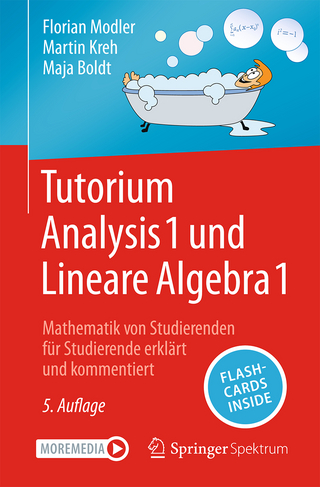
Student Solutions Manual for Beginning & Intermediate Algebra
Pearson (Verlag)
978-0-13-419419-6 (ISBN)
- Titel z.Zt. nicht lieferbar
- Versandkostenfrei
- Auch auf Rechnung
- Artikel merken
Beginning Intermediate Algebra is your guide to success with algebra. Martin-Gay's focus on you, the student, shapes her accessible writing and contributes to the popularity and effectiveness of this resource. This revision of Martin-Gay's algebra series continues her focus on what you need to be successful.
Elayn Martin-Gay has taught mathematics at the University of New Orleans for more than 25 years. Her numerous teaching awards include the local University Alumni Association’s Award for Excellence in Teaching, and Outstanding Developmental Educator at University of New Orleans, presented by the Louisiana Association of Developmental Educators. Prior to writing textbooks, Elayn Martin-Gay developed an acclaimed series of lecture videos to support developmental mathematics students. These highly successful videos originally served as the foundation materials for her texts. Today, the videos are specific to each book in her series. She has also created Chapter Test Prep Videos to help students during their most “teachable moment”–as they prepare for a test–along with Instructor-to-Instructor videos that provide teaching tips, hints, and suggestions for every developmental mathematics course, including basic mathematics, prealgebra, beginning algebra, and intermediate algebra. Elayn is the author of 12 published textbooks and numerous multimedia interactive products, all specializing in developmental mathematics courses. She has also published series in Algebra 1, Algebra 2, and Geometry. She has participated as an author across a broad range of educational materials: textbooks, videos, tutorial software, and courseware. This offers an opportunity for multiple combinations for an integrated teaching and learning package, offering great consistency for the student.
1. Review of Real Numbers
1.1 Study Skill Tips for Success in Mathematics
1.2 Symbols and Sets of Numbers
1.3 Fractions and Mixed Numbers
1.4 Exponents, Order of Operations, Variable Expressions and Equations
1.5 Adding Real Numbers
1.6 Subtracting Real Numbers
1.7 Multiplying and Dividing Real Numbers
1.8 Properties of Real Numbers
2. Equations, Inequalities, and Problem Solving
2.1 Simplifying Algebraic Expressions
2.2 The Addition and Multiplication Properties of Equality
2.3 Solving Linear Equations
2.4 An Introduction to Problem Solving
2.5 Formulas and Problem Solving
2.6 Percent and Mixture Problem Solving
2.7 Further Problem Solving
2.8 Solving Linear Inequalities
3. Graphing
3.1 Reading Graphs and the Rectangular Coordinate System
3.2 Graphing Linear Equations
3.3 Intercepts
3.4 Slope and Rate of Change
3.5 Equation of Lines
3.6 Functions
4. Solving Systems of Linear Equations
4.1 Solving Systems of Linear Equations by Graphing
4.2 Solving Systems of Linear Equations by Substitution
4.3 Solving Systems of Linear Equations by Addition
4.4 Solving Systems of Linear Equations in Three Variables
4.5 Systems of Linear Equations and Problem Solving
5. Exponents and Polynomials
5.1 Exponents
5.2 Polynomial Functions and Adding and Subtracting Polynomials
5.3 Multiplying Polynomials
5.4 Special Products
5.5 Negative Exponents and Scientific Notation
5.6 Dividing Polynomials
5.7 Synthetic Division and the Remainder Theorem
6. Factoring Polynomials
6.1 The Greatest Common Factor and Factoring by Grouping
6.2 Factoring Trinomials of the Form x2 + bx + c
6.3 Factoring Trinomials of the Form ax2 + bx + c and Perfect Square Trinomials
6.4 Factoring Trinomials of the Form ax2 + bx + c by Grouping
6.5 Factoring Binomials
6.6 Solving Quadratic Equations by Factoring
6.7 Quadratic Equations and Problem Solving
7. Rational Expressions
7.1 Rational Functions and Simplifying Rational Expressions
7.2 Multiplying and Dividing Rational Expressions
7.3 Adding and Subtracting Rational Expressions with Common Denominators and Least Common Denominator
7.4 Adding and Subtracting Rational Expressions with Unlike Denominators
7.5 Solving Equations Containing Rational Expressions
7.6 Proportion and Problem Solving with Rational Equations
7.7 Simplifying Complex Fractions
8. More on Functions and Graphs
8.1 Graphing and Writing Linear Functions
8.2 Reviewing Function Notation and Graphing Nonlinear Functions
8.3 Graphing Piecewise-Defined Functions and Shifting and Reflecting Graphs of Functions
8.4 Variation and Problem Solving
9. Inequalities and Absolute Value
9.1 Compound Inequalities
9.2 Absolute Value Equations
9.3 Absolute Value Inequalities
9.4 Graphing Linear Inequalities in Two Variables and Systems of Linear Inequalities
10. Rational Exponents, Radicals, and Complex Numbers
10.1 Radicals and Radical Functions
10.2 Rational Exponents
10.3 Simplifying Radical Expressions
10.4 Adding, Subtracting, and Multiplying Radical Expressions
10.5 Rationalizing Denominators and Numerators of Radical Expressions
10.6 Radical Equations and Problem Solving
10.7 Complex Numbers
11. Quadratic Equations and Functions
11.1 Solving Quadratic Equations by Completing the Square
11.2 Solving Quadratic Equations by the Quadratic Formula
11.3 Solving Equations by Using Quadratic Methods
11.4 Nonlinear Inequalities in One Variable
11.5 Quadratic Functions and Their Graphs
11.6 Further Graphing of Quadratic Functions
12. Exponential and Logarithmic Functions
12.1 The Algebra of Functions; Composite Functions
12.2 Inverse Functions
12.3 Exponential Functions
12.4 Exponential Growth and Decay Functions
12.5 Logarithmic Functions
12.6 Properties of Logarithms
12.7 Common Logarithms, Natural Logarithms, and Change of Base
12.8 Exponential and Logarithmic Equations and Problem Solving
13. Conic Sections
13.1 The Parabola and the Circle
13.2 The Ellipse and the Hyperbola
13.3 Solving Nonlinear Systems of Equations
13.4 Nonlinear Inequalities and Systems of Inequalities
14. Sequences, Series, and the Binomial Theorem
14.1 Sequences
14.2 Arithmetic and Geometric Sequences
14.3 Series
14.4 Partial Sums of Arithmetic and Geometric Sequences
14.5 The Binomial Theorem
| Erscheinungsdatum | 02.09.2016 |
|---|---|
| Sprache | englisch |
| Maße | 213 x 274 mm |
| Gewicht | 1588 g |
| Themenwelt | Mathematik / Informatik ► Mathematik ► Algebra |
| ISBN-10 | 0-13-419419-5 / 0134194195 |
| ISBN-13 | 978-0-13-419419-6 / 9780134194196 |
| Zustand | Neuware |
| Informationen gemäß Produktsicherheitsverordnung (GPSR) | |
| Haben Sie eine Frage zum Produkt? |
aus dem Bereich


